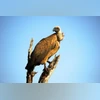The Centre has prohibited the production, sale, and distribution of all Nimesulide formulations — commonly used as an animal painkiller — after research by the Indian Veterinary Research Institute (IVRI) in Izatnagar, Bareilly, confirmed its harmful effects on vultures, reported The Times of India.
The decision followed controlled experiments in Haryana, where two Himalayan griffon vultures (Gyps himalayensis) were administered doses of Nimesulide similar to those found in the carcasses of livestock treated with the drug.
In the study, two vultures were given Nimesulide, while two others were administered saline as a control. Researchers observed that the treated birds showed elevated uric acid levels, a known marker of kidney failure, and both died within two days. Scientists noted that this rapid reaction was consistent with poisoning caused by other non-steroidal anti-inflammatory drugs (NSAIDs) like diclofenac and ketoprofen.
Quoting Abhijeet Pawde, who led the study during 2023-24, The Times of India mentioned that the importance of banning such drugs is to prevent vulture species from going extinct. He explained that their research demonstrated the high lethality of Nimesulide to vultures when they consume contaminated carcasses.
Nimesulide banned in several countries
The Central Drugs Standard Control Organisation (CDSCO), under the Department of Health and Family Welfare, implemented the ban through a gazette notification on Monday under the Drugs and Cosmetics Act, 1940. However, reports indicate that the drug is still accessible in rural areas, raising concerns about enforcement. Veterinary specialists have reiterated the need for stricter monitoring to ensure compliance.
Nimesulide, widely used for treating animals such as cattle, pigs, and horses, has been banned for pediatric use in several countries due to safety issues. Pawde pointed out that formulations for animals might contain impurities absent in human medicines, potentially increasing their toxicity.
Also Read
Experts have recommended safer alternatives like meloxicam and tolfenamic acid, citing their effectiveness and affordability. Another researcher, M Karikalan, argued that replacing toxic drugs like Nimesulide with safer options was both practical and necessary.
Future research will include investigating the toxicity of other drugs, such as paracetamol, to protect vultures and other scavenger species crucial to ecological balance.
Is Nimesulide banned for humans in India?
In June last year, the government banned a fixed-dose combination of Nimesulide and Paracetamol dispersible tablets, citing a lack of therapeutic justification and potential risks to people. The banned combinations included medicines for common infections, cough, and fever, such as Chlopheniramine Maleate + Codeine Syrup, Pholcodine + Promethazine, and Amoxicillin + Bromhexine, among others.
An expert committee recommended the ban, stating that these combinations posed risks to human health and served no justified medical purpose. The committee concluded that, in the interest of public safety, the manufacture, sale, or distribution of these combinations under the Drugs and Cosmetics Act, 1940, should be prohibited, with no scope for regulated use.
)